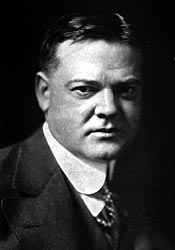
Grant Wood
1931
Oil on composition board
The John R. Van Derlip Fund; owned jointly with the Des Moines Art Center
|
Herbert Clark Hoover was born in 1874 in West Branch, Iowa. He lived with his parents and two siblings in a small cottage. Herbert's
parents died - his father from typhoid fever and his mother from pneumonia - when he was very young. In 1884, 10-year-old "Bertie"
moved to Oregon to live with his uncle, a country doctor. At 17, he entered Stanford University, from which he graduated with a degree in
engineering.

|
Herbert Hoover |
Hoover became a very successful mining engineer, making his fortune operating mines in San Francisco, England, Australia, and China. When World
War I broke out, Hoover established the American Relief Committee in London at the request of the United States government, helping more
than 100,000 Americans to escape war-torn Europe. Later he chaired the Commission for Relief in Belgium and served as the United States
Food Administrator. After the war, he created the American Relief Administration, administering more than 100 million dollars for clothing
and food for oppressed Europeans and Russians recovering from German occupation. When government funds for that program ran out, Hoover
secured private contributions to keep it going. |
|
Hoover's dedication to relief efforts made him a hero. Both political parties wanted him to become their presidential candidate. He ran for a
time in the 1928 Democratic primaries, but was ultimately victorious as a Republican candidate. Recognizing the political advantage of his
popular rags-to-riches story, Hoover kicked off his campaign with a big public rally in his rural hometown. In 1929 the poor orphan boy
from Iowa became president of the United States.
The Hoover Legend
After a large majority elected him President, Hoover assumed heroic status in the public perception. Hoover's life story adapted
itself easily to two uniquely American ideals: The "rags-to-riches" story, and "anyone can grow up to be President."
The effort to build up a legend around Hoover's life that began during his term as President was a forerunner of the "image
making" campaigns deemed essential by today's politicians. In fact, Hoover badly needed a friendly, approachable image. He was a
serious man who was uncomfortable speaking in public, and seemed stiff and boring in front of big crowds.1
1 In part because of the Great Depression and his ineffective policies for dealing with it, Hoover is
seldom seen as a great President. As a result, he was not re-elected to the Presidency in 1932. Nonetheless, Hoover was widely praised
for his many other accomplishments. For his leadership in war and famine relief, he is remembered as "The Great Humanitarian."
|











